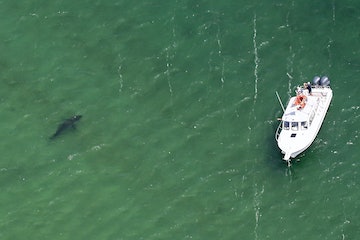Sharks — And Shark Tourism — Are Booming Off New England’s Beaches
Why that’s good news for families (and sharks).

Once considered a rare sighting, great white sharks have become frequent visitors to the shallow waters off Cape Cod over the past decade. In early July, the Cape saw the largest and potentially most dense population of great white sharks anywhere in the world. But the best could be yet to come: consider that the shark population tends to peak in late August and early September, in sync with warmer waters, just as some of the Cape’s summer resort towns reach their own peak population of vacationing families.
While the image of hundreds of great whites patrolling the waters off a popular beach has gripped the popular imagination since at least 1975, when Jaws debuted, the shark resurgence off the Cape is mostly a good news story of ecological comeback. (And climate change — as ocean temperatures rise, scientists expect great white sharks to arrive in the waters off Cape Cod earlier and to stay longer.)
A new study earlier this summer estimated that some 800 white sharks visited the shallow waters along the Cape’s eastern shoreline between June and October from 2015 to 2018.
“The estimate provides an important baseline that can be used to monitor the performance of conservation measures for the broader population, which declined by as much as 80% as fishing pressure increased in the 1970s and 1980s,” reported Megan Winton, lead author of the study, in a press release from the Atlantic White Shark Conservancy (AWSC).
For perspective, a 2021 study of sharks off the California coast — another global hotspot for great white sharks — estimated the presence of 300 white sharks swimming along the coast, making Cape Cod’s white shark population the largest seasonal meeting point in North America by a considerable margin.
“Cape Cod is the only area in the region where researchers can feasibly monitor the population, and our estimates suggest that the Cape is among the larger white shark hotspots worldwide, which is good news from a conservation standpoint,” Winton said.
Why the big resurgence in sharks? It’s thanks largely to the gray seal — the sharks' primary prey — which has returned to the Cape in huge numbers. The gray seal was almost driven to extinction due to excessive hunting decades ago, but its recovery began after the implementation of the U.S. Marine Mammal Protection Act in 1972. Today, the seal population has surpassed 50,000. And the sharks have followed.
While it took longer for the white shark population to rise along with the seals, their population has been steadily increasing off the eastern coast of the United States. It also helped that great white sharks were granted national protection in 1997, followed by Massachusetts state protection in 2005.
The resurgence of the great white sharks off the Cape offers a unique opportunity not just for researchers, but for parents and kids who are fascinated by these often misunderstood apex predators.
The Atlantic White Shark Conservancy Shark Center in Chatham, a nonprofit on the Cape, lets kids immerse themselves in the shark’s world (without getting in the water) through interactive exhibits and videos. The center also offers private guided tours where groups of up to 10 visitors can walk through the interactive exhibits and displays at their own pace with an AWSC educator on hand to guide them through the displays.
The AWSC also offers shark excursions — you can spend an hour cruising the Chatham Harbor and spotting the sharks and other wildlife in the water, in the company of an expert naturalist who can tell the bigger story of the changing ecosystem off the Cape and the research efforts underway. (Other outfitters running shark-spotting tours include White Shark Tours Cape Cod, which offers three-hour tours for up to six people at a time, and Monomoy Sportfishing, which offers a four-hour tour that combines shark watching with whale watching.)
AWSC runs group tours through Labor Day Weekend (they also offer pricier charter tours — supported by a shark-spotting plane — until early October). If you'll be near Cape Cod over Labor Day Weekend this is the way to end the summer. And if not, sets your sights on next summer. The waters, they are a’ changin.